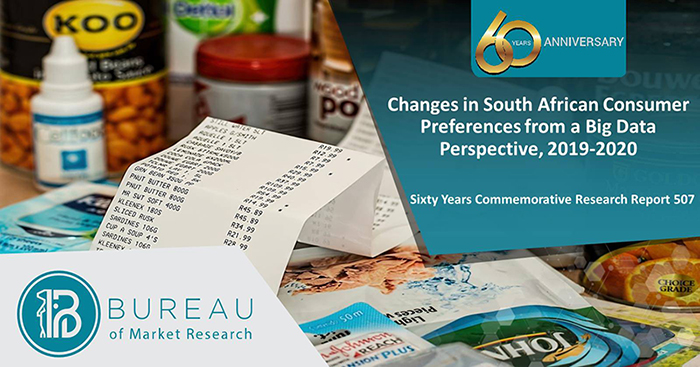News & Media
Pandemic reshaping buying patterns
Consumer preferences have changed rapidly during the past decade. Because Unisa’s Bureau of Market Research (Pty) Ltd (BMR) aspires to continuously keep track of changing consumer preferences, a Market Intelligence Research Unit (MIRU) was established during early 2020. The report under discussion, entitled Changes in consumer preferences from a big data perspective, 2019 to 2020, is the first BMR report from the MIRU.

In this report, authored by Prof Carel van Aardt, MIRU aims to provide insights into changing consumer preferences and behaviour by using qualitative, quantitative, administrative and National Accounts data captured on a big data platform. The core focus of the study was to provide an indication of changes in consumer preferences during the period May 2019 to May 2020 with specific reference to the impact of the depressed economic environment, Covid-19, and the resulting lockdown on such preferences. This was done by, inter alia:
- Identifying the product and service categories in which there was increasing consumer interest over the period 2019 to 2020.
- Identifying the product and service categories in which there was decreasing consumer interest.
- Determining the impact of declining economic growth rates on the interest of consumers in specific product and service categories.
- Analysing the impact of Covid-19 and the resulting lockdown on consumer interest in specific product and service categories.
From the research conducted for this report, it appears that consumer interest in vehicles generally declined slowly between May 2019 and March 2020, followed by a rapid decline from March 2020 to late April 2020. This was due to a combination of factors, including the lockdown, job losses and economic stagnation. This period of decline was followed by a slight increase in interest from late April 2020 to the beginning of May 2020.
An interesting pattern is evident with respect to consumer interest in computing equipment during the period May 2019 to January 2020. Consumer interest in computing equipment remained at a consistent level, after which interest in laptops increased substantially. The increased interest in laptops was driven by a combination of factors, the most important of which was an increased need to work from home as the effects of Covid-19 became more widely known during January to March 2020. This was followed by the national Covid-19 lockdown from March 2020 onwards, giving impetus to the interest in laptops for home working purposes. It is evident that many employees, who were previously office-bound, will increasingly work away from their erstwhile offices, even after the lockdown has been eased.
This finding is confirmed by the fact that office chairs and home equipment have seen the greatest increases in consumer interest with respect to household furniture, equipment and appliances. The interest of consumers in food and non-alcoholic beverages remained at the same level irrespective of declining economic growth and the national lockdown. However, in the case of alcoholic beverages the scarcity value of alcohol and tobacco, brought about by the lockdown regulations, resulted in a very strong consumer interest in these products. It is, however, expected that this heightened consumer interest in alcohol and tobacco will normalise at its pre-lockdown levels as their scarcity value declines once the sale of alcohol and tobacco is again allowed.
Consumer preferences for catering and accommodation already started a strong decline during February 2020, well before the lockdown, which was exacerbated by the general lockdown. The catering and accommodation time series shown in this report indicates that these two economic sub-sectors will not generate large-scale interest over the short to medium term and will in all probability take long to recover to pre-February 2020 levels in terms of both consumer interest and financial performance.
It is clear from this report that the period 2019 to 2020 was one of declining economic growth, with the national lockdown putting additional pressure on the macroeconomy and consumers. Furthermore, it is evident from this report that the declining economic growth rates, as well as the national lockdown, had statistically significant impacts on consumer interest in products and services in South Africa.
The findings of this report agree to a large extent with those of a number of other studies in South Africa and internationally, focusing on the impact of Covid-19 on consumers, consumer behaviour and consumer interests. In these studies it is shown that it is not just consumer interests that are changing because of Covid-19, but also their behaviour. Surveys have shown that staying alive and keeping others alive have become top priorities for consumers.
The findings of this report also show that consumers’ interests and behaviour have adapted, and are still adapting to the lockdown lifestyle. Consumers are increasingly improving their home environments for lockdown living and are also adapting parts of their homes for remote working purposes. Consumers are increasingly looking for other shopping solutions due to the fear of contagion as well as temporary store closures. It is clear from a variety of studies internationally that consumers will not revert en masse to their old shopping patterns post lockdown.
Most probably, Covid-19 consumer behaviour will become the new normal. One of the main reasons for this is that consumers actively adopted a wide range of existing and new technologies for lockdown living which they will not abandon in favour of their old interests and behaviour patterns since a new consumption normal has been created during lockdown. As lockdown and the impact of Covid-19 continue, it can be expected that such consumer interests and behaviour patterns will be strengthened and will become the new normal.
Changes in consumer preferences from a big data perspective, 2019 to 2020 (Research Report 507) was compiled by Prof Carel van Aardt.
* By Madeleine Goetz, Senior Research Coordinator, Bureau of Market Research
Publish date: 2020-09-17 00:00:00.0

 Unisa remains anchored among the waves
Unisa remains anchored among the waves
 Inhlanyelo Hub explores sustainable tourism initiatives in Marico Biosphere Reserve
Inhlanyelo Hub explores sustainable tourism initiatives in Marico Biosphere Reserve
 Unisa KZN Region explores extending university services to KwaMpungose community
Unisa KZN Region explores extending university services to KwaMpungose community
 Unisa's catalytic niche areas provide industry-focused mining innovations
Unisa's catalytic niche areas provide industry-focused mining innovations